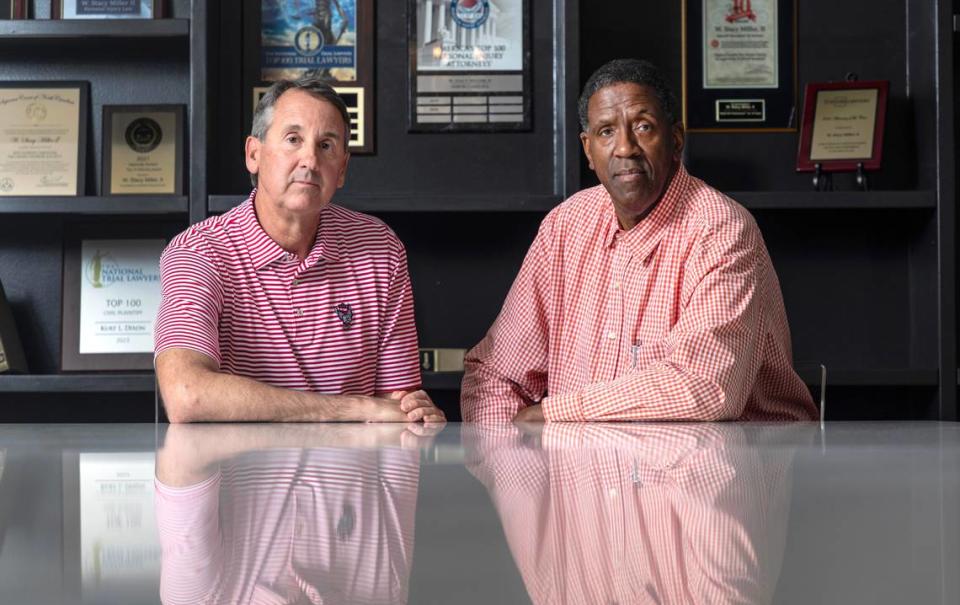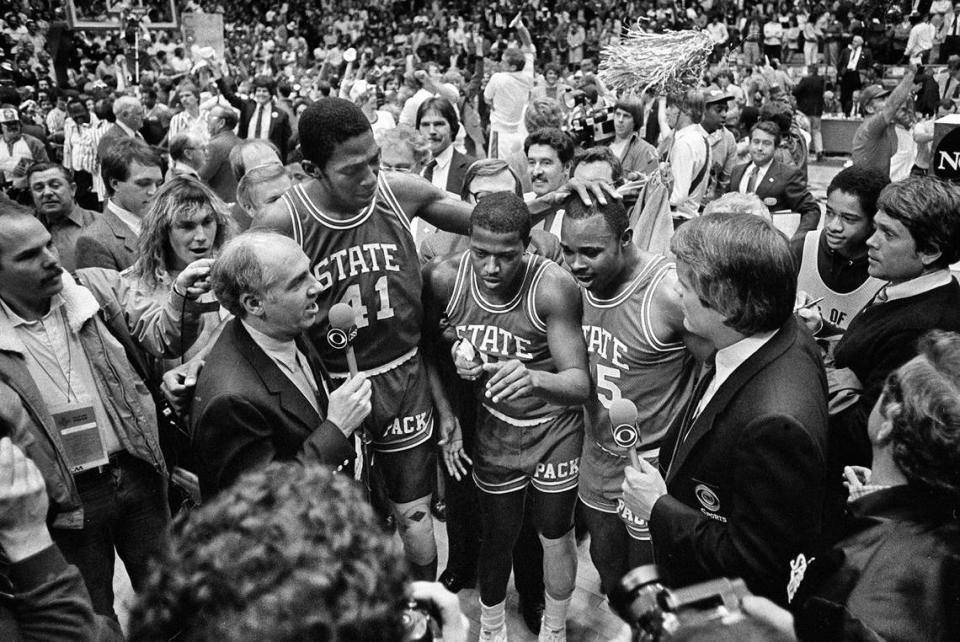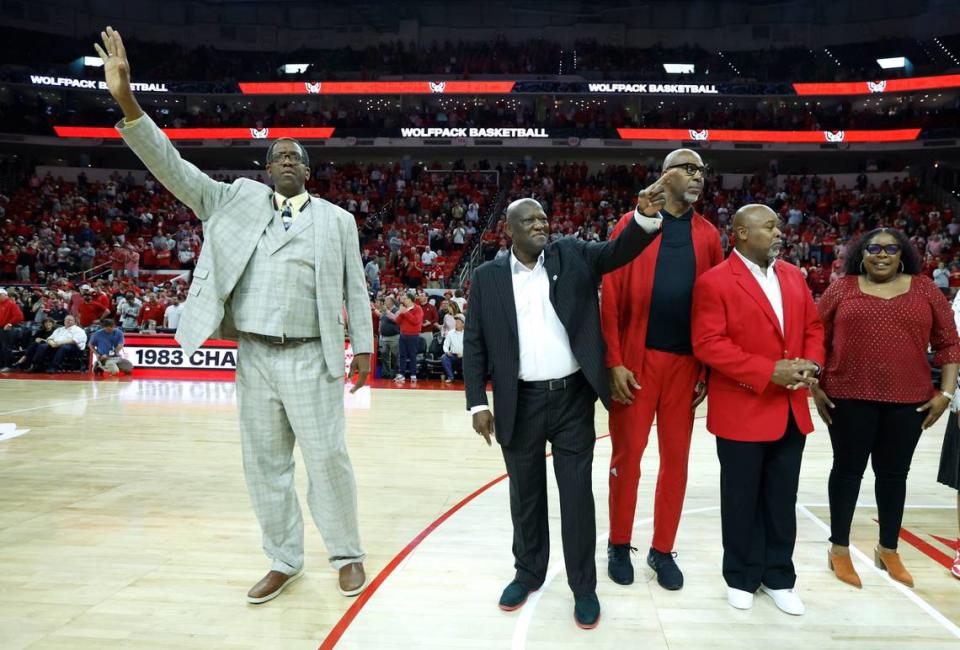NC State Cardiac Pack basketball team, a March Madness icon, sues NCAA for NIL earnings
A group of players from N.C. State’s 1983 national championship basketball team are suing the NCAA for using their name, image and likeness without their permission or providing compensation, citing the 2021 Supreme Court antitrust case against the governing body.
The lawsuit, filed in Wake County on Monday, says the NCAA used images and videos of the “Cardiac Pack” to advertise the NCAA Men’s Basketball Tournament, among other commercial uses.
“For more than 40 years,” the lawsuit states, ”the NCAA and its co-conspirators have systematically and intentionally misappropriated the Cardiac Pack’s publicity rights — including their names, images, and likenesses — associated with that game and that play, reaping scores of millions of dollars from the Cardiac Pack’s legendary victory.”

The Wolfpack won the 1983 national championship and earned its “Cardiac Pack” nickname after winning the ACC tournament and then six thrilling NCAA Tournament games. That included a 54-52 upset win over Houston in the championship game on Lorenzo Charles’ buzzer-beating dunk, a play that is replayed regularly during the NCAA Tournament.
Plaintiffs in the case are Thurl Bailey, Alvin Battle, Walt Densmore, Tommy DiNardo, Terry Gannon, George McClain, Cozell McQueen, Walter Proctor, Harold Thompson and Mike Warren. The NCAA and Collegiate Licensing Company are listed as defendants. The plaintiffs demand a jury trial.

Absent from the filing are former players Sidney Lowe, Ernie Myers and Dereck Whittenburg. Charles’ winning play came when he grabbed the ball off Whittenburg’s long shot at that fell short of the rim. Charles died in 2011.
“It’s the Cinderella story of Cinderella stories,” said Stacy Miller of Miller Law Group, lead counsel.
Warren told the News & Observer that the team, which remains close, discussed the possibility of a lawsuit for many years. It felt now was the right time due to the changing landscape of collegiate athletics.
The plaintiffs are working with the estates of Charles and Quinton Leonard for their inclusion. Warren and McQueen hope the others will be included at some point.
“We’ve been an incredibly close group of guys for over 40 years. One of the factors in our success, I believe, was how close we were as a team,” Warren said. “That’s continued for our lifetime to this point as adults. We’re friends, we know each other’s families, we stay in touch. Everyone was a part of this decision.”
The group has worked with Jim Valvano’s family, as well, and feel like the late coach would be proud of their efforts.
Elliot Abrams of the Cheshire Parker Schneider law firm joins Miller as part of the representation. Abrams represented North Carolina wide receiver Tez Walker last year during the football player’s eligibility lawsuit against the NCAA.
McQueen contacted his teammates in a group chat after the 2021 decision, saying, “This is what we’ve been waiting for.” Warren contacted Miller after the team decided to pursue the case.
Miller believes this case is a first and said it’s appropriate for an iconic team.

The plaintiffs note the $1 billion revenue generated each year from March Madness and the $20 million in broadcast rights over the next 10 years. They list the NCAA website’s use of videos from the team’s postseason run, which only play after advertisements. The lawsuit stays the NCAA has “never paid one cent” to the plaintiffs.
“The NCAA has for decades leveraged its monopoly power to exploit student-athletes from the moment they enter college until long after they end their collegiate careers,” the lawsuit states. “It has conspired with conferences, colleges, licensing companies and apparel companies to fix the price of student-athlete labor near zero and make student-athletes unwitting and uncompensated lifetime pitchmen for the NCAA.”
The lawsuit, which includes verbiage from the NCAA’s current bylaws, also alleges the NCAA coerced young student-athletes into signing contracts that stripped them of legal rights, citing North Carolina law.
The lawsuit says the NCAA’s alleged illegal actions deprived the plaintiffs of profits they could have earned from publicity rights and damaged opportunities to maximize compensation. It’s unknown how much the NCAA earned from the Cardiac Pack’s publicity. Miller said the NCAA’s actions of using the players’ names, images and likenesses without their consent has long been prohibited in the United States.
The amount of damages sought by the group would be determined at trial, but it would be in excess of $25,000 and be tripled once determined.
Warren said the 1983 team remains fans of N.C. State and college athletics at large, noting the hope that always comes during March Madness. They want this to provide fairness for everyone.
“The NCAA has profited off of our team, and they’ve done the same off of other teams and other athletes. It’s not as if it was a one-off thing,” Warren said. “Especially in our case, it’s been 40 years. I do believe that we would really like to see some equitable treatment across the board for everyone that’s helped promote college athletics.”

 Yahoo Sports
Yahoo Sports 
